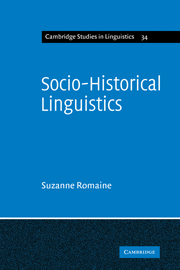Book contents
- Frontmatter
- Contents
- Dedication
- Preface
- Dedication
- 1 Methodology and aims
- 2 Methods for a sociolinguistic study of historical syntax
- 3 The history of the relative clause/markers in English with special reference to Middle Scots
- 4 The linguistic variables
- 5 The extralinguistic variables: methods for the reconstruction of language in its social context
- 6 Analysis of the data by two sociolinguistic techniques: cross-product analysis and implicational scaling
- 7 Variable rule analysis of the data
- 8 The bearing of sociolinguistic data on linguistic hypotheses
- 9 On the epistemological status of sociolinguistic theory
- Bibliography
- Index
2 - Methods for a sociolinguistic study of historical syntax
Published online by Cambridge University Press: 05 May 2010
- Frontmatter
- Contents
- Dedication
- Preface
- Dedication
- 1 Methodology and aims
- 2 Methods for a sociolinguistic study of historical syntax
- 3 The history of the relative clause/markers in English with special reference to Middle Scots
- 4 The linguistic variables
- 5 The extralinguistic variables: methods for the reconstruction of language in its social context
- 6 Analysis of the data by two sociolinguistic techniques: cross-product analysis and implicational scaling
- 7 Variable rule analysis of the data
- 8 The bearing of sociolinguistic data on linguistic hypotheses
- 9 On the epistemological status of sociolinguistic theory
- Bibliography
- Index
Summary
The relevance of sociolinguistics to syntax
In this chapter I examine the contribution which variable data in historical syntax can be expected to make to descriptive and theoretical issues, with special reference to my study of the relative system in Middle Scots. A number of linguists have argued that variable data can be used in support of abstract linguistic analyses, and that quantitative relations bear directly on, and provide evidence for, ‘deciding’ some important theoretical issues. If such claims are tenable, then the argument put forward by both the quantitative and dynamic paradigms, that variation should form the core of linguistic theory, seems well justified.
Carden (1972), for example, has claimed that native speakers' judgements about the grammaticality or acceptability of sentences are crucial for determining the nature and operation of syntactic systems. He argues that by seeking out the patterns of variation in acceptability in and among speakers, we can confirm postulated abstract structures, since variation in the data results from rule differences and differences in rule ordering. Likewise, Bailey (1970: 77) has maintained that an analysis of variable data allows us ‘to confirm fairly abstract syntactic structures, rather than cast them into doubt’.
It was, however, Labov who first programmatically outlined the questions which the study of variation (in the form of variable rules) could address, thus suggesting contributions it might make to linguistic theory.
- Type
- Chapter
- Information
- Socio-Historical LinguisticsIts Status and Methodology, pp. 29 - 52Publisher: Cambridge University PressPrint publication year: 1982



